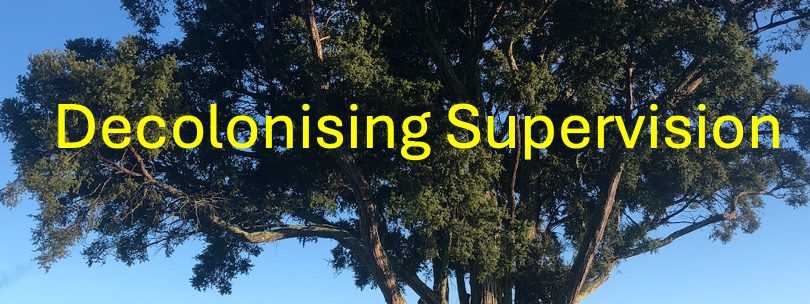Decolonising Supervision
Invitation to join a new community of practice for supervisors interested in enhancing a lived commitment to Te Tiriti o Waitangi in our work.
Also view articles exploring this kaupapa.
Also view articles exploring this kaupapa.
Nga Mihi!
Kororia ki te Atua, Kaihanga, Kaiwhakaora o te Ao, te Karaiti me te Wairua Tapu.
Nō Ingarani, nō Tenemāka ōku tīpuna. Ko Te Awa Kairangi te kāinga. My ancestors hail from England and Denmark, and Upper Hutt has become my home, with its beautiful awa, ngahere and maunga.
Ko te manaakitanga me te hapahapai te mahi. I work as a supervisor, counsellor, author, researcher and ordained minister; all of which are western colonial constructs but can be spaces for decolonisation.
Ko Hiriwa – Silvia Purdie – ahau.
This work is part of an ongoing conversation about this thing we call ‘supervision’; as in, professional or clinical supervision, a service provided across the community sector (and other areas) for personal support and professional development. It typically (in my experience) involves regular (e.g. monthly) individual sessions between a kaimahi and a supervisor, paid for by the organisation, with an emphasis on self-reflection. But it can also take other forms, e.g. group. Cultural supervision has emerged as a specific form to support safe cultural engagement and practice. Supervision is for many ‘people-professionals’ (including increasingly those in ministry) a normal and mandated part of their work.
I was recently prompted by Wairua Tapu to put out a pānui to the Bible & Treaty facebook group inviting kōrero on the topic of “decolonising supervision”, and several people joined in some awesome conversations online. We are currently forming a community of practice around this kaupapa, and hoping to develop thinking in this field. Our starting point is an agreement that supervision is great, and important, but that some critical reflection is required to move supervision from being a western ‘kawanatanga’ practice to enabling decolonising professional practice.
Kororia ki te Atua, Kaihanga, Kaiwhakaora o te Ao, te Karaiti me te Wairua Tapu.
Nō Ingarani, nō Tenemāka ōku tīpuna. Ko Te Awa Kairangi te kāinga. My ancestors hail from England and Denmark, and Upper Hutt has become my home, with its beautiful awa, ngahere and maunga.
Ko te manaakitanga me te hapahapai te mahi. I work as a supervisor, counsellor, author, researcher and ordained minister; all of which are western colonial constructs but can be spaces for decolonisation.
Ko Hiriwa – Silvia Purdie – ahau.
This work is part of an ongoing conversation about this thing we call ‘supervision’; as in, professional or clinical supervision, a service provided across the community sector (and other areas) for personal support and professional development. It typically (in my experience) involves regular (e.g. monthly) individual sessions between a kaimahi and a supervisor, paid for by the organisation, with an emphasis on self-reflection. But it can also take other forms, e.g. group. Cultural supervision has emerged as a specific form to support safe cultural engagement and practice. Supervision is for many ‘people-professionals’ (including increasingly those in ministry) a normal and mandated part of their work.
I was recently prompted by Wairua Tapu to put out a pānui to the Bible & Treaty facebook group inviting kōrero on the topic of “decolonising supervision”, and several people joined in some awesome conversations online. We are currently forming a community of practice around this kaupapa, and hoping to develop thinking in this field. Our starting point is an agreement that supervision is great, and important, but that some critical reflection is required to move supervision from being a western ‘kawanatanga’ practice to enabling decolonising professional practice.
